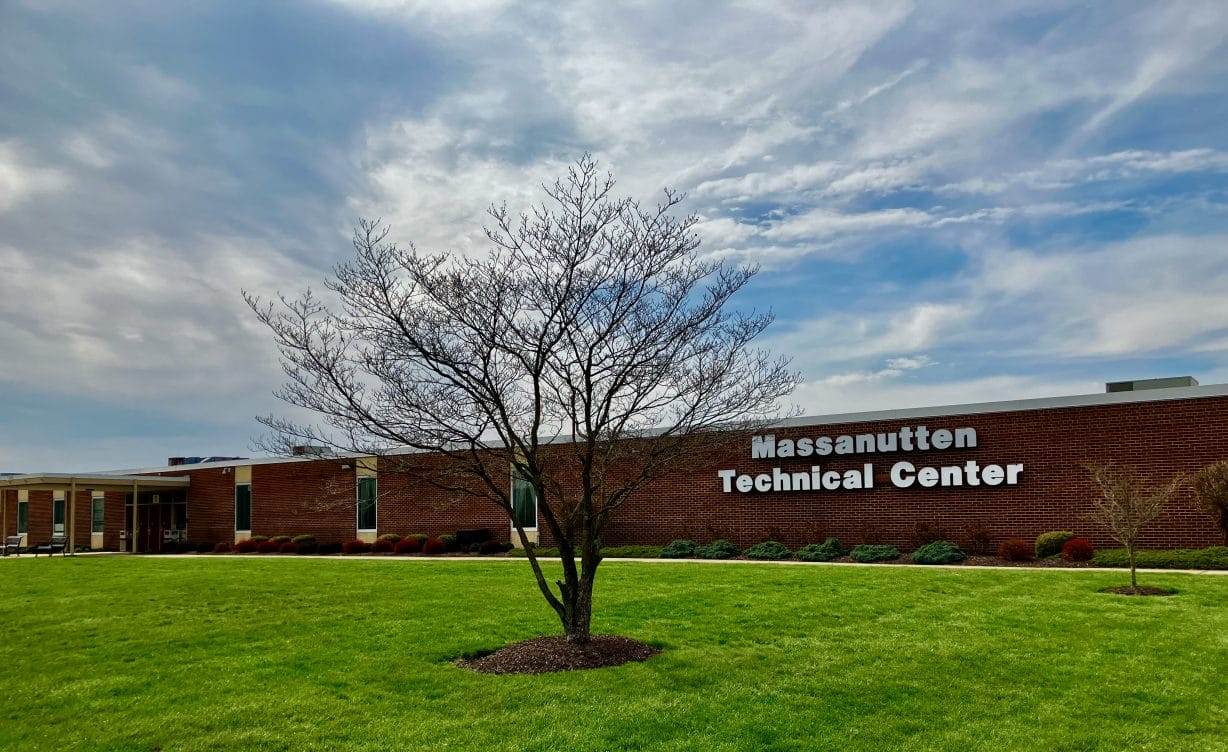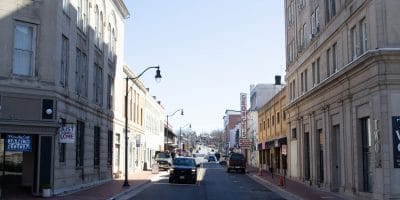
By Bridget Manley, publisher
In the wake of the Harrisonburg School Board’s decision Tuesday to end its six-decade partnership with the Rockingham County School Board in operating the Massanutten Technical Center, plans are underway to provide those vocational courses and opportunities to city school students.
The city school board voted to withdraw from Massanutten Technical Center’s operating agreement, effective at the end of the 2026-2027 school year. The move followed a months-long dispute with the county school board over voting power on the vocational school’s executive board and concerns among city school board members that they were kept in the dark after Rockingham County officials explored options for a new multi-million-dollar facility on county land.
Harrisonburg school superintendent Michael Richards told The Citizen that school officials are exploring the possibility of offering career and technical education programs through a hybrid model, partnering with local colleges, universities and employers like Sentara, which operates Sentara RMH Medical Center, to offer the same courses to HCPS students that MTC has provided.
Richards said he is preparing to form a committee to explore those partnerships, which will include business leaders, parents, students and other stakeholders.
He said a hybrid model – which likely wouldn’t include a traditional brick-and-mortar vocational school for city students – would cost less than the funding the city of Harrisonburg currently allocates to Massanutten Technical Center, especially if career and technical programs are held at other institutions, such as colleges or employers.
“We will actually save money,” Richards said.
Richards said tailoring a program to meet students’ specific needs, rather than supporting a broader program, would also save costs. Some programs at Massanutten Technical Center have only one student from the city school district enrolled, he said.
School board president Emma Phillips told The Citizen that she was excited about the possibilities of a hybrid model.
“The idea of a hybrid [career and technical education] program that doesn’t require a traditional building could really provide significant savings for the division,” Phillips said. “There are lots of good models out there to explore. We’re confident in the ability of our superintendent to be innovative and explore creative solutions that best suit the needs of our students.”
City schools already offer many CTE programs separate from MTC, including broadcasting, business, healthcare, marketing, computer science, and nursing, according to Richards.
“Ironically, we’re very good at partnerships and we’re very good at CTE,” Richards said. “I am confident that our students well come out of this just fine.”
While the city will forge its own path for now because they could not reach an agreement that both systems could accept, Richards did not rule out future collaborations with the county school system.
“We enjoy several strong and productive partnerships with the county schools, and I’m absolutely open to future conversations about how we might collaborate further around [career and technical education] after we’ve built our own program,” Richards said.
What’s the initial fallout?
While some county officials said they were caught off guard by the city’s announcement, statements from Rockingham County Schools Superintendent Larry Shifflett and board president Sara Horst were courteous to HCPS, while emphasizing their ongoing support for county students.
County School Board Chair Sara Horst issued a statement to The Citizen saying, “We wish HCPS the best as it moves towards determining [career and technical education] programming for their students.”
“Our intent continues to be to strengthen and improve the facilities and programming offered to RCPS students,” Horst’s statement said. “The training offered at MTC is an integral part of Rockingham County workforce development and offers incredible opportunities for our students that we will continue to offer, regardless of Harrisonburg’s decision to end the partnership. I look forward to sharing plans with our community in the near future.”
Shifflett issued a public statement that started by saying the county respects “our neighbors in Harrisonburg and understand this decision was not made lightly.”
“We are committed to supporting a smooth transition for all students currently enrolled, including those from the city,” Shifflett said.
Board member Jackie Lohr, the board’s longest-serving member who is currently running for re-election in District 1, took a different approach. Posting on social media, Lohr urged city and county residents to contact their local representatives to emphasize that political differences should not derail such a successful program.
“Let me be clear: This is bad for students, and it’s bad for taxpayers,” Lohr said.
“MTC exists to serve all students in our region— regardless of their ZIP code. Whether my future nurse, plumber, or mechanic lives in the city or the county, they deserve access to the best possible programs in the best possible facility,” Lohr continued. “And as someone who pays property taxes in the county and sales taxes in the city, I believe all taxpayers deserve access to a highly trained local workforce. That only happens when we work together.”
Harrisonburg city officials said they were aware the city school board was considering many options, although they didn’t know what decision the board would make until Tuesday’s meeting.
“The relationships involved with MTC have been a point of conversation for some time, and we knew multiple options were being considered – in fact, there had been much media coverage of what may or may not happen,” said city spokesman Michael Parks. “But we were not aware of what specific action would definitely be taken until it was taken [Tuesday] night.”
Harrisonburg Mayor Deanna Reed said she had been in communication with the board and had heard all options, also didn’t know what the school board was going to do before Tuesday’s meeting.
“What’s important to me is that we do what is best for our children and their families. At the end of the day, that should always be the focus moving forward,” Reed said.
Which programs have city students used most?
Rockingham County and Harrisonburg City schools have been jointly operating Massanutten Technical Center, which sits close to the Rockingham County-Harrisonburg line, for more than sixty years.
The career and technical school’s executive board has been composed of both school boards, and much of the disagreement between the two in recent months was about the balance of power.
Rockingham County board members said they wanted more voting power on the executive board, noting their share of students enrolled — and, thus, operating expenses — were higher than Harrisonburg schools.
While the numbers vary each year based on enrollment, Rockingham County covered 71% of the operating expenses for the 2024/2025 school year, and Harrisonburg paid the remaining 29%.
Of the Massanutten Technical School’s enrollment of 1,028 high school students in the 2024-2025 school year, 778 students were from the county schools, while 250 students came from city schools.
The career and technical school offers 20 programs, including agriculture production, architecture and interior design, auto technology, aviation maintenance, building management, carpentry, collision repair, cosmetology, criminal justice, culinary arts, cybersecurity, dental careers, diesel technology, electricity, fire and rescue, health careers, heating and cooling technology, veterinary science, visual arts and 3D animation, and welding.
Harrisonburg city students have the highest enrollment in auto technology (34 HCPS students versus 72 RCPS students), dental programs (20 HCPS students versus 41 RCPS students), welding (17 HCPS students versus 37 RCPS students), and health careers (17 HCPS students versus 35 RCPS students), according to the school data. Programs in agriculture production, aviation maintenance, and building management are less popular with city school students.
With the city students leaving, Massanutten Technical Center’s total enrollment could drop by about a quarter, including decreases of 32% in the automotive program, 16% in dental programs, 31% in welding, and 32% in health careers.
Horst told The Citizen that she believes that county students will fill those spots quickly because of how many students are waitlisted. She said she doesn’t expect the school will have to drop any programs.
“We expect to fill many of the vacant seats quickly, given the current waitlists,” Horst said. “Interest in MTC programs among RCPS students remains high. There may be a year or two when we need to focus on boosting enrollment in one or two programs, but I am confident that, with a strategic plan to promote MTC and engage more students, we will be able to fill all available spots. We have no concerns about low enrollment leading to the closure of any programs.”
Massanutten Technical Center is slated to receive more than $6.2 million in local funding and nearly $800,000 in state funding during the 2025-26 school year, according to the budget passed in March of 2025.
Fifteen percent of the operating budget is divided equally between the two school systems, while the remaining 85% is allocated based on the number of students from each system. The school would lose more than $1.8 million on average annually from Harrisonburg.
The two school systems have an 80/20 split for capital improvements. However, Richards told The Citizen that the last time the city and county invested in capital improvements was during the 2017-18 school year.
The proposed new career and technical school facility that the Rockingham County Supervisors have started exploring has an estimated cost of $70 million. That proposed facility would be built in the Rockingham Innovation Village, on land already owned by the county.
Previous improvement plans before the falling out between the two school boards involved a $28 million renovation of the current Massanutten Technical Center building.
The exploration of a new facility was another point of contention for the Harrisonburg school board, who expressed feeling excluded from the decision-making process, especially given the higher cost compared to the amount originally planned for renovating the existing school.
Phillips said the city board will continue to build partnerships as its done with other initiatives, such as the city’s outdoor learning spaces, the codeVA program and the World Is My Classroom program.
“Harrisonburg has a strong track record of leveraging community partnerships to create impactful educational experiences,” Phillips said. “As always, we will ensure that all stakeholders are part of the process — our students, parents, educators, and community members – so that the program we create truly meets the needs of everyone involved.”
Thanks for reading The Citizen, which won the Virginia Press Association’s 2022 News Sweepstakes award as the top online news site in Virginia. We’re independent. We’re local. We pay our contributors, and the money you give goes directly to the reporting. No overhead. No printing costs. Just facts, stories and context. We value your support.













